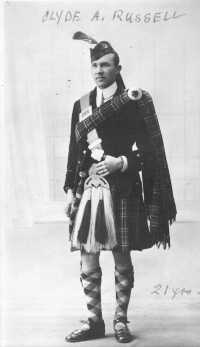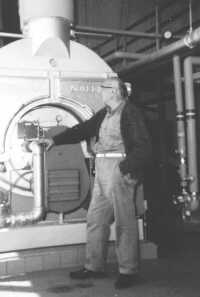 |
Clyde Arthur Russell is the 5th from the right. In the background is the Birmingham LDS Chapel which he and the others helped to build. |
Clyde Arthur Russell
by Mary B. Russell
Clyde Arthur Russell was born 19 Jan 1893 at Salt Lake City, Utah, being the son of David Johnston Russell and Jean Hood. The latter two people were caught in the Gospel Net in Scotland, and Clyde was one of their first American generation.
When he was still a small boy his parents moved to Eureka, Utah, where his father worked at times in the mines, and for many years as manager of the Dixon, Taylor and Russell furniture store. Being the
 |
Clyde Arthur Russell is the 5th from the right. In the background is the Birmingham LDS Chapel which he and the others helped to build. |
fourth in a family of nine, Clyde had the companionship of older ones, and the responsibility of helping with younger brothers and sisters. His life followed the usual pattern until he became 19 years old, at which time he was called to go on a mission to England.
At the present time we are used to seeing young men of that age leaving for missions, but around 1913 most of the missionaries were married men. Birmingham, Warwickshire was the field of his labor, and his picture shows him with his group standing on the steps of a newly completed chapel in that city, this being one of the first chapels to be built in England. After an honorable release he visited relatives in Scotland, donned the kilts, and had a picture taken which is much prized by his descendents.
Scotland, donned the kilts, and had a picture taken which is much prized by his descendents.
After his return home he worked in the mines long enough to repay the cost of his mission, plus sufficient to take him to Detroit, Michigan, and to start him in school in that city. All went according to plan, until a certain party evening in the Detroit branch of the LDS Church. The President of the branch called a brother Russell to come and help with the gifts, and a young woman in the audience turned to her mother and said "That is the kind of man I would like to marry".
And the returned missionary from England and the new emigrant from the same country found much in common and were married by the Mission President on the 12th of July, 1919. Clyde progressed in schooling until he passed for entrance to Ann Arbor University to study engineering. Not having any rich relatives, having no collateral,
insufficient work, etc., we found ourselves stymied for a way to raise the necessary expense and were forced to modify our plans. The Michigan State Auto School needed a draftsman to make drawings for a book about to be published on Automotive electrics, and after Clyde had finished this assignment he was asked to stay on as teacher.
Here he had pupils from all over the world, most of them important men in their own countries, but limited often in their use of the English language and anxious to learn of
America's industrial genius. They told of the wonderful patience of their instructor and of his willingness to give generously of his time to assist them.
However not even a nice new home could submerge the desire to raise his children in the West, and when the first child was ready for school, Clyde left his fine position, sold his home, and started back to the West. Here he hoped that his children would find companions within their own church, and have a closer tie up with the
organizations of the church than was possible in Detroit at that time.
Fate moved us around a bit until we finally settled in California, and here we found exactly the environment we wanted,
namely sufficient companionship from Oakland 3rd (old Dimond) Ward to accompany the children through all their schools and yet plenty of opportunity to defend the Gospel and develop their faith. It has been a good training ground for them.
Clyde had the usual trials incident to the depression, but was sought out by an electrician to build up a department of electric motor repair. It was a fine success, and when the owner was forced by illness to retrench, he turned this department over to Clyde for Clyde's own personal business, and this gave us a nice living for many years.
When the new inter stake center was completed the business was sold and Clyde became custodian of the Center. It was new work except for the motors and boilers, but it was much enjoyed until our
 Temple was nearing completion, and then Clyde was transferred to the Temple to be stationary engineer in charge of the boilers, motors, etc. He loved this work, and on Thursdays and Fridays, when he finished his shift at 3 p.m. he just had time to wash and change and walk upstairs to the Temple proper, and take his place as an ordinance worker. He worked at the veil and did all else that was asked of him.
Temple was nearing completion, and then Clyde was transferred to the Temple to be stationary engineer in charge of the boilers, motors, etc. He loved this work, and on Thursdays and Fridays, when he finished his shift at 3 p.m. he just had time to wash and change and walk upstairs to the Temple proper, and take his place as an ordinance worker. He worked at the veil and did all else that was asked of him.
Clyde held many other positions of service in the church from time to time. He was a Sunday School Superintendent, Boy Scout Leader, Ward Clerk, First and Second
Councilor in Bishoprics, Ward Teaching Supervisor and Theology teacher in the Sunday School. He held the office of High Priest in the
Melchizidek Priesthood.
When his family had to say good by to their husband and father on the 12th of July, 1966, our 47th wedding anniversary, [this was the date of the funeral - Ed.] we knew we had known a gentle-man, in every sense of that word. Always courteous, always kind and quiet, he found no task too inconvenient to do for his children. Day and night he was ready to serve them. His poetic soul found expression in writing poems of the incidents in the lives of his children, and those children now prize the collection of those poems. He truly lived his religion, his actions were just a quiet consistent day by day expression of his convictions, and they never varied by a hair's breadth. To his children he did not say "Go", it was taken for granted that they would "Come", which they did. Our home was full of love and kindness and co-operation and we were rich in all eternal blessings. As his wife and widow it has always been comforting to read the thoughts of his fine mind, and I add a few of his lines that summarized his philosophy as he reminisced on our courting days.
Do You Remember
Clyde Arthur Russell
Do you remember the little lane
Where the leafy trees arched above us;
Where the sod was so cool after the rain
And the air was so clean around us?
How swiftly the moments flew as we walked;
And how our steps lagged now and again
Lest, as we went silently (or we talked)
We come, too soon, to the end of the lane.
Sometimes the trees formed a curtain of lace
'gainst the light of the sun's dying ray;
And over all was the stillness of peace
As evening reached for the hand of day.
Do you still feel the strange and lowly hush
That comes only at that magic hour
When the sun has gone and a last faint blush
Steals down the sky in a smoky blur?
And do you remember how, before us
Life seemed only a lane, unending
And delightful, where the feathered chorus
Their songs into the world were sending?
We have come a long way through the lane now,
And we have stumbled time and again;
But you've helped me often, and I've helped you
And we're finer for the things we've learned.
We couldn't see all these changes to be,
For we looked through youth's bright eyes;
And youth sees only what it wants to see
And that is where it's charm mostly lies.
But we still can see lacy trees and the sod
And a glorious sunset at the end;
We still have faith in both man and our God
And we are ready to face the next bend.